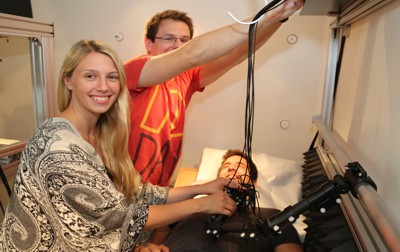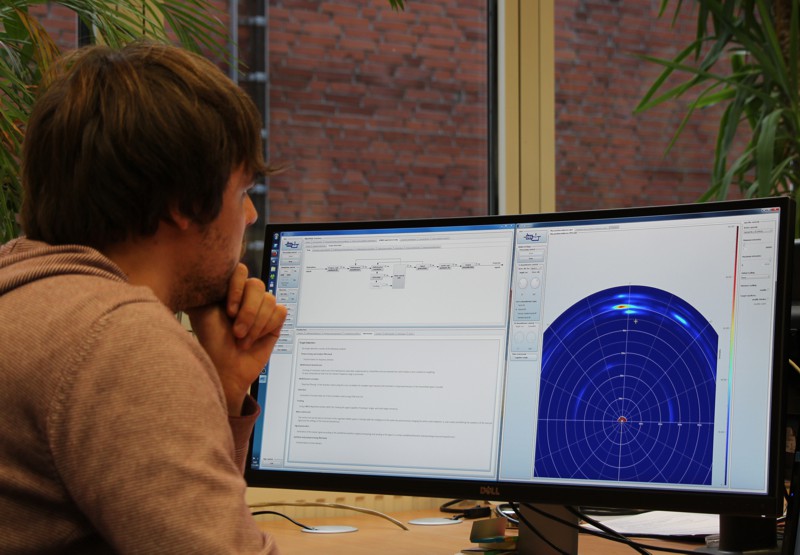Research Topics
Our research is focused on adaptive signal processing with special focus on real-time application in speech communication in adverse environments, medical applications and underwater systems. Please find a few details about our current projects below.
Speech and Audio Processing

In different applications such as automotive hands-free telephony or speech dialogue systems, the desired speech signal is disturbed by background noise (engine, wind noise, etc.) and by echoes (due to multipath propagation from a loud-speaker to a microphone). In order to reduce the disturbing components while keeping the speech signal as natural as possible multi-channel adaptive signal enhancement algorithms are utilized.
In the field of speech enhancement we focus mainly on the following applications:
- speech enhancement schemes (hands-free and in-car communication) for cars and
- signal enhancement for breathing protection masks.
For our research on automotive hands-free and in-car communication systems we do simulations (both offline as well as real-time simulation), but also we investigate the behavior of our algorithms in real environments. For that reason we have several systems installed in different kinds of cars. Our cars are equipped with several conventional and some "non-conventional" microphones as well as with several loudspeakers. Thus, we can investigate all kinds of systems.
In addition to the design of speech enhancement algorithms such as localization and beamforming, echo and feedback cancellation, noise reduction, or bandwidth extension we investigate also the automatic evaluation of the quality of such systems. For that purpose several subjective and objective test are investigated. Since we need a realistic environment simulation for such tests we do also research on realistic environment simulations.
In the broader context of automatic system evaluation, we also investigate the quality of transmitted speech in general. Here, the focus lies on the quality of speech after an entire signal processing chain. For telecommunication scenarios, such a chain may inlude speech enhancement, source coding, and network transmission. While the overall quality of transmitted speech is, of course, of interest, the main goal of our research is to, additionally, identify the technical causes of sub-optimal quality within the processing chain.
Medical Signal Processing

To measure signals of the heart, of the brain, or of nerves with a high temporal resolution, usually electrically based measurement types as electrocardiography (ECG), eectroencephalography (EEG), or electroneurography (ENG), respectively or magnetically based measurement types as magnetocardiography (MCG), magnetoencephalography (MEG), or magnetoneurography (MNG) are used. Since both types of measurements have their advantages and disadvantages both methods should be used for clinical diagnosis. Unfortunately, the operation of suitable super-conducting quantum interference devices (SQUIDs) for magnetic based measurements is in general very expensive.
In order to provide an alternative, sensors have been developed based on the ME-effect in recent years in the collaborative research groups at Kiel University. These sensors have the potential to be an appropriate alternative to SQUIDs. Unfortunately, these sensors also record mechanical vibrations, whereby the desired signals are often superimposed by unwanted signal components. To reduce this effect, an adaptive cancellation approach using non-magnetic noise reference sensors is realized by us. This approach is realized in real-time using our own tool.
Furthermore, we work on brain-computer interfaces (right now based on pure electrical interfaces, but hopefully soon also using magneto-electric sensors).
Another research area is the analysis of Parkinson speech. Parkinson patients often suffer from a speech disorder called dysarthria. To classify the severity of the speech disorder and located the origin of the problem in speech production in the vocal tract, speech recordings of parkinson patients are analyzed using instrumental measures.
Signal Processing for Underwater Applications

As the technical faculty of the CAU is located directly at the Kiel fjord it seems obvious that our chair is also active in signal processing for underwater applications.
This research area is mainly divided into three parts:
- MIMO SONAR Signal Processing,
- Cognitive Systems,
- Underwater Communication.
- Underwater Magnetic Signal Processing.
The research fields of MIMO processing and cognitive systems are currently merged into one research topic, while the main emphasis is put on the development of the MIMO part.
In the past additional emphasis was put in the development of a Kalman filter based tracking approach and the detection and classification of received sounds stemming from marine mammals.
